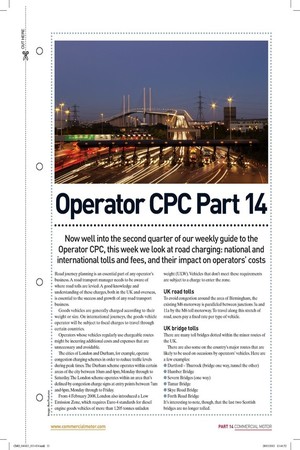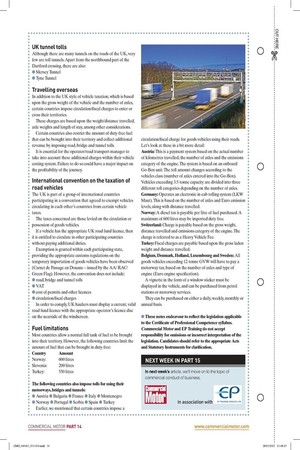Operator CPC Part 14 Now well into the second quarter
Page 21

Page 22

If you've noticed an error in this article please click here to report it so we can fix it.
of our weekly guide to the Operator CPC, this week we look at road charging: national and international tolls and fees, and their impact on operators costs Road journey planning is an essential part of any operator's business. A road transport manager needs to be aware of where road tolls are levied. A good knowledge and understanding of these charges, both in the UK and overseas, is essential to the success and growth of any road transport business.
Goods vehicles are generally charged according to their weight or size. On international journeys, the goods vehicle operator will be subject to fiscal charges to travel through certain countries.
Operators whose vehicles regularly use chargeable routes might be incurring additional costs and expenses that are unnecessary and avoidable.
The cities of London and Durham, for example, operate congestion charging schemes in order to reduce traffic levels during peak times. The Durham scheme operates within certain areas of the city between 10am and 4pm, Monday through to Saturday. The London scheme operates within an area that's defined by congestion charge signs at entry points between 7am and 6pm, Monday through to Friday.
From 4 February 2008, London also introduced a Low Emission Zone, which requires Euro-4 standards for diesel engine goods vehicles of more than 1.205 tonnes unladen weight (ULW). Vehicles that don't meet these requirements are subject to a charge to enter the zone.
UK road tolls To avoid congestion around the area of Birmingham, the existing M6 motorway is paralleled between junctions 3a and 11a by the M6 toll motorway. To travel along this stretch of road, users pay a fixed rate per type of vehicle.
UK bridge tolls There are many toll bridges dotted within the minor routes of the UK.
There are also some on the country's major routes that are likely to be used on occasions by operators' vehicles. Here are a few examples: • Dartford —Thurrock (bridge one way, tunnel the other) • Humber Bridge • Severn Bridges (one way) • Tamar Bridge • Skye Road Bridge • Forth Road Bridge It's interesting to note, though, that the last two Scottish bridges are no longer tolled. UK tunnel tolls Although there are many tunnels on the roads of the UK, very few are toll tunnels. Apart from the northbound part of the Dartford crossing, there are also: • Mersey Tunnel • Tyne Tunnel Travelling overseas In addition to the UK style of vehicle taxation, which is based upon the gross weight of the vehicle and the number of axles, certain countries impose circulation/fiscal charges to enter or cross their territories.
These charges are based upon the weight/distance travelled, axle weights and length of stay, among other considerations.
Certain countries also restrict the amount of duty-free fuel that can be brought into their territory and collect additional revenue by imposing road, bridge and tunnel tolls.
It is essential for the operator/road transport manager to take into account these additional charges within their vehicle costing system. Failure to do so could have a major impact on the profitability of the journey.
International convention on the taxation of road vehicles The UK is part of a group of international countries participating in a convention that agreed to exempt vehicles circulating in each other's countries from certain vehicle taxes.
The taxes concerned are those levied on the circulation or possession of goods vehicles.
If a vehicle has the appropriate UK road fund licence, then it is entitled to circulate in other participating countries without paying additional duties.
Exemption is granted within each participating state, providing the appropriate customs regulations on the temporary importation of goods vehicles have been observed (Carnet de Passage en Douane — issued by the AA/ RAC/ Green Flag). However, the convention does not include: • road, bridge and tunnel tolls • VAT • cost of permits and other licences • circulation/fiscal charges In order to comply, UK hauliers must display a current, valid road fund licence with the appropriate operator's licence disc on the nearside of the windscreen.
Fuel limitations Most countries allow a normal full tank of fuel to be brought into their territory. However, the following countries limit the amount of fuel that can be brought in duty-free: Country Amount Norway: 600 litres Slovenia: 200 litres Turkey: 550 litres The following countries also impose tolls for using their motorways, bridges and tunnels: • Austria • Bulgaria • France • Italy • Montenegro • Norway • Portugal • Serbia • Spain • Turkey Earlier, we mentioned that certain countries impose a circulation/fiscal charge for goods vehicles using their roads. Let's look at these in a bit more detail: Austria: This is a payment system based on the actual number of kilometres travelled, the number of axles and the emissions category of the engine. The system is based on an onboard Go-Box unit. The toll amount changes according to the vehicles class (number of axles entered into the Go-Box). Vehicles exceeding 3.5-tonne capacity are divided into three different toll categories depending on the number of axles. Germany: Operates an electronic in-cab tolling system (LKW Maut). This is based on the number of axles and Euro emission levels, along with distance travelled.
Norway: A diesel tax is payable per litre of fuel purchased. A maximum of 600 litres may be imported duty free.
Switzerland: Charge is payable based on the gross weight, distance travelled and emissions category of the engine. The charge is referred to as a Heavy Vehicle Fee.
Turkey: Fiscal charges are payable based upon the gross laden weight and distance travelled.
Belgium, Denmark, Holland, Luxembourg and Sweden: All goods vehicles exceeding 12-tonne GVVV will have to pay a motorway tax, based on the number of axles and type of engine (Euro engine specification).
A vignette in the form of a window sticker must be displayed in the vehicle, and can be purchased from petrol stations or motorway services.
They can be purchased on either a daily, weekly, monthly or annual basis.
• These notes endeavour to reflect the legislation applicable to the Certificate of Professional Competence syllabus. Commercial Motor and EP Training do not accept responsibility for omissions or incorrect interpretation of the legislation. Candidates should refer to the appropriate Acts and Statutory Instruments for clarification.









































